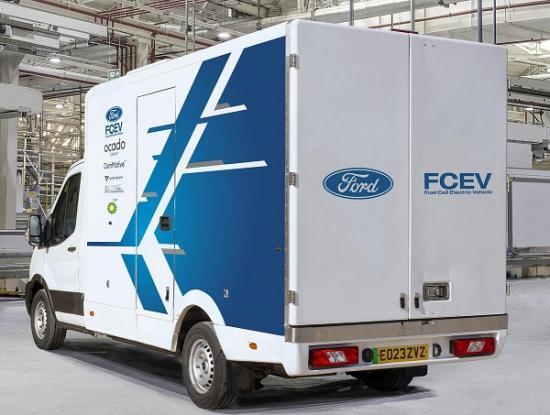Fcvgen2.0 Ford - A Hydrogen Fuel Cell-powered Version Of The Ford Transit Van
16th June 2023

The FCVGEN2.0-Ford project will design and develop a hydrogen fuel cell-powered version of the Ford Transit van, with the Ford Dagenham engine factory to be re-purposed for initial production of the vehicle.
By bringing the manufacturer, vehicle operator and supply chain businesses together, it aims to establish a business case for the wider rollout of hydrogen light commercial vehicles for E-Transit customers.
Partners include Ocado Retail, BP, Cambustion, Viritech and Cygnet Texkimp, with £8m awarded by government matched by industry to a total £16.3m.
Tim Slatter, Chair of Ford in Britain, said: "Ford believes that the primary application of fuel cells could be in its largest, heaviest CVs to ensure they are emission-free, while satisfying the high daily energy requirements our customers demand.
"We are excited to be exploring new ways to make clean deliveries an option for even our hardest working vans on the road."
A low-volume test fleet of eight fuel cell Ford E-Transits will run for six-month periods over the three-year project to 2025.
Test fleet data will provide insights into the total cost of owning and operating a large van, with increased range and operating hours to match its diesel-powered equivalent and without the need to charge.
The prototype Ford E-Transits will be fitted with a high-power fuel cell stack, in conjunction with significant hydrogen storage capability, optimised for safety, capacity, cost and weight.
Meanwhile, Viritech will develop hydrogen pressure vessels using its proprietary integrated mounting system which reduces the cost and weight of fitting hydrogen pressure vessels to a vehicle.
Timothy Lyons, CEO of Viritech said: "Believing that fuel cell hydrogen electric vehicles will play a vital role in decarbonising commercial vehicles, and that they will become a vital contributor to sustainable transportation, Viritech is proud to be at the forefront of the development of this critical technology."
